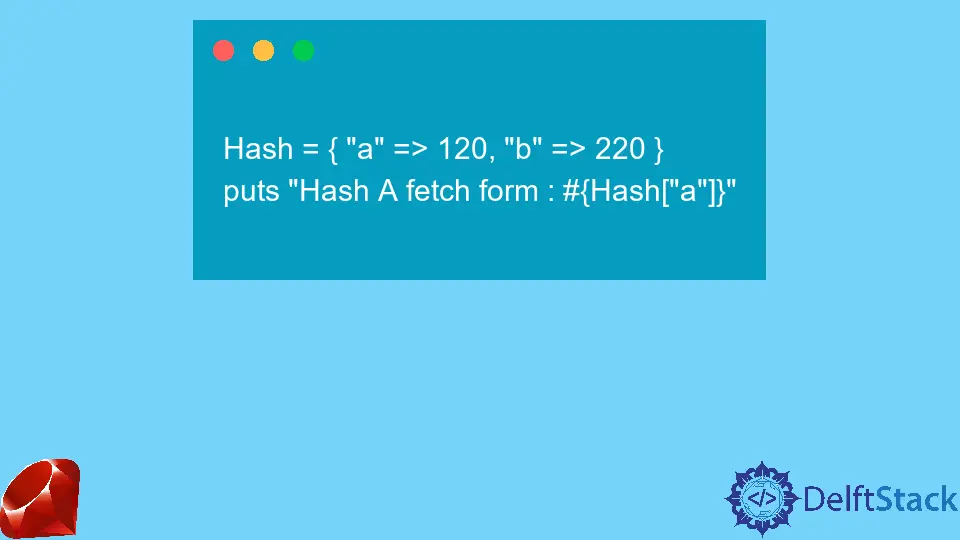How to Get Hash Value in Ruby using the fetch() Method
- Understanding Ruby Hashes
- The fetch() Method Explained
- Handling Missing Keys with fetch()
- Conclusion
- FAQ

In the world of programming, working with hashes is an essential skill, especially in Ruby. Hashes are like dictionaries in other programming languages; they store key-value pairs, making data retrieval efficient and straightforward.
This tutorial will guide you through the process of getting hash values in Ruby using the fetch() method. Whether you’re a beginner or looking to brush up on your Ruby skills, this article will provide you with practical examples and explanations. By the end, you’ll be well-equipped to handle hashes in your Ruby projects and understand the nuances of the fetch() method.
Understanding Ruby Hashes
Before diving into the fetch() method, let’s take a moment to understand what a hash is in Ruby. A hash is a collection of key-value pairs where each key is unique. You can think of it as a way to store related data. For instance, if you wanted to store information about a person, you could use a hash to map their name to their age, address, and other attributes.
Here’s a simple example of a Ruby hash:
person = { name: "John", age: 30, city: "New York" }
In this example, :name, :age, and :city are keys, while “John”, 30, and “New York” are their corresponding values. Now that we have a basic understanding of hashes, let’s explore the fetch() method in Ruby, which allows us to retrieve values from a hash safely and efficiently.
The fetch() Method Explained
The fetch() method is a powerful tool in Ruby for accessing values in a hash. Unlike simply using hash[key], which returns nil if the key doesn’t exist, fetch() raises an error. This feature can be beneficial because it allows you to handle missing keys more gracefully.
The syntax for the fetch() method is straightforward:
hash.fetch(key, default_value)
key: The key you want to look for in the hash.default_value: An optional argument that specifies what to return if the key is not found.
Let’s take a look at a practical example of how to use fetch() in Ruby.
person = { name: "John", age: 30, city: "New York" }
name = person.fetch(:name)
age = person.fetch(:age, "Not specified")
country = person.fetch(:country, "USA")
puts name
puts age
puts country
Output:
John
30
USA
In this code snippet, we are using the fetch() method to retrieve the values for :name and :age. For :country, which does not exist in the hash, we provide a default value of “USA”. This way, if the key is absent, we still get a meaningful response instead of an error or nil.
The fetch() method is particularly useful in scenarios where you want to ensure that your program behaves predictably, especially when dealing with user input or external data sources. By using fetch(), you can avoid unexpected nil values and handle missing keys more effectively.
Handling Missing Keys with fetch()
One of the most significant advantages of using the fetch() method is its ability to handle missing keys gracefully. Instead of returning nil, you can specify a default value that will be returned when the key does not exist. This feature can be particularly useful in applications where data integrity is crucial.
Consider the following example where we want to access user preferences stored in a hash:
preferences = { theme: "dark", notifications: true }
theme = preferences.fetch(:theme, "light")
notifications = preferences.fetch(:notifications, false)
language = preferences.fetch(:language, "English")
puts theme
puts notifications
puts language
Output:
dark
true
English
In this case, we are trying to fetch the user’s theme, notifications, and language preferences. The fetch() method allows us to provide default values for keys that may not be present. If the :language key is missing, it will return “English” instead of nil, ensuring that our application has a fallback option.
This approach not only enhances the robustness of your code but also improves user experience by providing sensible defaults. By using fetch() in this manner, you can create applications that are resilient to changes in data structure or user input.
Conclusion
In summary, the fetch() method in Ruby is a versatile and powerful way to access hash values. It provides a safe means of retrieving data while allowing you to specify default values for missing keys. This feature can significantly improve the robustness of your code and enhance user experience. Whether you’re building a simple script or a complex application, mastering the fetch() method will undoubtedly serve you well in your Ruby programming journey.
FAQ
-
What is a hash in Ruby?
A hash in Ruby is a collection of key-value pairs where each key is unique. -
How does the fetch() method differ from accessing hash values directly?
The fetch() method raises an error if the key does not exist, while direct access returns nil. -
Can I provide a default value when using fetch()?
Yes, you can specify a default value that will be returned if the key is not found. -
Is fetch() a built-in method in Ruby?
Yes, fetch() is a built-in method for Ruby hashes. -
How can I handle exceptions when using fetch()?
You can use begin-rescue blocks to handle exceptions if you want to catch errors raised by fetch().
Aminul Is an Expert Technical Writer and Full-Stack Developer. He has hands-on working experience on numerous Developer Platforms and SAAS startups. He is highly skilled in numerous Programming languages and Frameworks. He can write professional technical articles like Reviews, Programming, Documentation, SOP, User manual, Whitepaper, etc.
LinkedIn